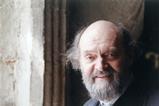The writing of the classic hymn 'In Christ Alone’ by Stuart Townend and Keith Getty shows how teamwork and grabbing the moment can change lives
How was the song written?
There are magnificent themes running through worship classic ’In Christ Alone’, but its writing also suggests a more prosaic message: When inspiration strikes, write it down before you forget it!
When songwriter Keith Getty came up with the melody for the hymn, he quickly scribbled it down on the back of an unpaid electricity bill. He later came across it in his office and made a recording for reference.
Having made a point of meeting up at a 2000 worship conference with co-writer Stuart Townend, whose 'How Deep the Father’s Love' impressed him deeply, Getty later sent him a few melodies on a CD, to see what he could do with them.
The tune for 'In Christ Alone' was the first one to play and it immediately struck Townend, who has variously described it as “magnificent, haunting” and “brilliant”. Considering that such a classic, enduring melody deserved a timeless theme to match its stature, he immediately worked on a flow of ideas based on the life, death and resurrection of Jesus.
This pleased Getty tremendously. His main aim in all the work he and his organisation do in composing modern church music, as he terms it, is to create hymns that help people to understand the faith. The gospel story is the heart of this, so Townend’s words thrilled him.
It may be the most popular hymn in the last half-century
For Townend, working on the lyrics was an emotional experience. It drew him to go beyond sketching Jesus’ life to also highlighting its implications for everyone. He told WeAreWorship that he was trying to put into words, “what it means for Christ to have gone through what he went through… and how that completely changes my life.”
Getty thought the words were “stunning,” but still made the odd tweak. The original first line was “My hope is found in Christ alone,” but Getty suggested switching the halves around to "In Christ alone my hope is found". This meant Townend re-writing the verse, because it spoiled his rhyming scheme. Initially this irritated him, but now he considers it “a stroke of genius,” and appreciates that Getty has a real sensitivity to lyric writing, even though he is known for his melodies.
Why was it controversial?
The strength of the song lies not just in the enduring, powerful melody and lyrics so rich that every phrase has a depth and purpose, but in the way that words and music work together. Just as the verse swells into its second half, we can sing lines like “As he rose in victory, sin’s curse has lost its grip on me” and “No power of hell, no scheme of man can ever pluck me from his hand.”
The song has had its share of both praise and contention. Townend says that he gets as much response about this song as all the rest of his extensive catalogue put together.
One email described how an American soldier serving in Iraq prayed through each verse of the song every day, and it supported him through the pressures of living in a war zone.
However, when this popularity led to the American Presbyterian Church wanting to include it in their new hymnal in 2013, their Committee on Congregational Song disagreed, because of the line, “Till on that cross as Jesus died / The wrath of God was satisfied.” They wanted to replace this with “…as Jesus died/the love of God was magnified,” because they had theological objections to the idea of God’s anger, even though that wrath was being directed at himself in Jesus.
As Getty and Townend are both passionate about teaching deep truth in song, they refused to allow the change – it would have compromised God’s justice and mercy. So with a vote of nine to six against, the song never made it into the hymn book.
It’s their loss. The song has made such a dramatic impact that – a mere four years after it was written in 2001 – it featured in a BBC Songs of Praise top ten best-loved hymns survey.
Getty told me: “It may be the most popular hymn in the last half-century. My whole life stems from that tune, written on the back of a Northern Ireland Electricity bill when I was twenty-five!”





































